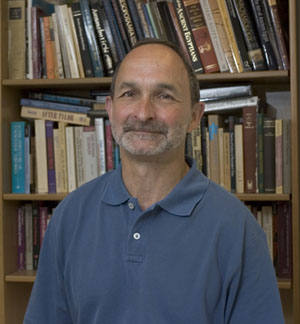
Richard Blanton
- Emeritus Faculty // Anthropology
Office and Contact
Email: blantonr@purdue.edu
Courses
ANTH 100 - Introduction to Anthropology
ANTH 507 - Theory in Sociocultural Anthropology
ANTH 606 - Conduct of Anthropological Inquiry
Richard Blanton received his PhD. in anthropology from the University of Michigan in 1970 and joined the faculty at Purdue University in 1976.
Specialization
Archaeology, economic anthropology, regional analysis, political anthropology, cross-cultural analysis, theory.
Since joining Purdue in 1976, he has done approximately 36 months of archaeological field work over many field seasons in Guatemala, Mexico, and Turkey, and has also completed several cross-cultural comparative research projects. He has reported on this research in twelve books and 67 articles and chapters published through diverse outlets, including Cambridge University Press, Science, American Anthropologist, American Antiquity, Journal of Field Archaeology, and Current Anthropology. He is best known for his research on the evolution of pre-Hispanic Mesoamerican civilization, especially in Central Mexico and the Valley of Oaxaca, but has also contributed to several more general anthropological topics, including the economics of peasant households and household archaeology, the evolution of market systems in early civilizations, pre-modern world-systems, and cultural ecology. Blanton's recent theoretical and comparative research on the nature of early state formation and political economy is regarded as a new departure that is making a contribution to the current discourse on the evolution of complex human societies. This work is cited in the literatures on early civilizations in the Mediterranean, Africa, South Asia, and China, as well as the New World. He was a founding member of the Society for Economic Anthropology and has served as its president, and now serves on a committee that is publishing a world-wide sample of archaeological cultures for comparative research, sponsored by the Human Relations Area Files. His current research, funded by the National Science Foundation, uses a comparative method to evaluate Rational Choice and Collective Action Theory as they apply to pre-modern state formation, and he is working with two colleagues to establish a new archaeological project in Tlaxcala, Mexico.
Positions at Purdue University
1983 – present Professor of Anthropology
1976 – 1983 Associate Professor of Anthropology
Service to the Profession
Executive Committees, American Anthropological Association (1992, 1995-6)
Founding Member and President, Society for Economic Anthropology (1991-1992)
Honors and Awards
Fellow, American Association for the Advancement of Science (1989- )
Research Associate in Anthropology, The Field Museum, Chicago
Five Most Important Publications
Blanton, Richard, 1978. Monte Albán: Settlement Patterns at the Ancient Zapotec Capital, Academic Press. (reprinted 2004 by Percheron Press).
Blanton, Richard, et al. 1993. Ancient Mesoamerica: A Comparison of Change in Three Regions, 2nd revised edition, Cambridge University Press.
Blanton, Richard, 1994. Houses and Households: A Comparative Study, Plenum Press.
Blanton, Richard, et al. 1996. “A Dual-Processual Theory for the Evolution of Mesoamerican Civilization.” Current Anthropology 37: 1-14, 65-68.
Blanton, Richard, et al. 1999. Ancient Oaxaca: The Early Monte Albán State, in Case Studies in Early Civilizations, Rita Wright, series editor, Cambridge University Press. Chapter 1 translated into Chinese and published as Vol.4 of Huaxia Archaeology (Shandong Province Museum publication)
Two Recent Publications
Blanton, Richard, 2000. The Hellenistic, Roman, and Byzantine Settlement Patterns of the Western Coastlands of Rough Cilicia, British Archaeological Reports, International Series 879.
Blanton, Richard, 2004. “Settlement Pattern and Population Change in Mesoamerican and Mediterranean Civilizations: A Comparative Perspective,” in Side-by-Side Survey: Comparative Regional Studies in the Mediterranean World, Susan Alcock and John Cherry (eds.), pp. 206-240. Oxbow Books.
Extramural Grant Support
National Science Foundation 1969, 1972-3, 1973-5, 1977-8, 1987-9, 1996-9, 2001-5 (total $420,000)
Kellogg Foundation (co-PI with James Vorst)($100,000)
Field Experience
University of Pennsylvania Tikal Project (Guatemala) l966, 1967
University of Michigan Basin of Mexico Archaeological Survey 1966, l967, 1969
Rice University Valley of Oaxaca, Mexico, Archaeological Survey l97l and l972
Hunter College, CUNY Valley of Oaxaca, Mexico, Archaeological Survey l972 to l976
Purdue University Valley of Oaxaca, Mexico, Archaeological Survey l977 to 1981
Dumbarton Oaks, Washington, D. C. Summer Research Seminar On Empire, Province, and Village in Aztec History 1986
Director, Purdue University Project on Inequality and Housing Variation Among Peasants 1987 to 1994
Purdue University Rough Cilician (Turkey) Archaeological Survey 1995-99
Purdue University/Lawrence University, Evaluation of Collective Action Theory Through Cross-Cultural Analysis of Pre-Modern States 2002-present
Purdue University Archaeological Investigations at the Collins Enclosure Middle Woodland Site 2003-2004 (with Matt Coon)